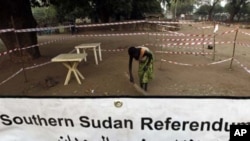While Sudan’s referendum has gone smoothly for the country’s millions of voters, many of the people who have made that possible say things aren’t going as well for them. Polling officials across southern Sudan complain they aren’t being paid for their work, or even given food and water during their shifts, and are calling on the government to give them their salaries.
Polling official Simon Laku says he received money for his first two days of work – 10 pounds a day for water and food – but has not been given food, water or money since.
“The two days, the day before yesterday and yesterday we worked without water, without food, we worked just like that without anything and today may be the same. There’s nothing that has been brought to us since morning,” he says.
Some charitable organizations have pitched in to support the workers, but polling official Jada Clement says even that assistance is inadequate.
“Since the work was so tedious, you stand from morning up to six without even water. We only receive from good Sudanese who came here, organizations like women’s organizations. They bring for us crates of water, but also this water is hot. It is creating for us a lot of challenges.”
Clement adds that the workers do not know when or if they will be paid for their services.
“Since the day one I think there was really nothing that the subcommittee managed to come and tell us exactly you people you are working on such amount. And up to now we know we just do know anything, whether we will be paid or not. Those are the challenges we are facing: water nothing, food nothing.”
But the chairman of the South Sudan Referendum Bureau, Chan Reec Madut, insists that before the voting started, the bureau sent money to the state high committee to pay the wages of polling officials.
“This is not true. We have paid them. We disbursed 5 million Sudanese pounds to all the states of southern Sudan ahead of the polling,” he says. “If they have not received this it might be a delay in the banking transactions.”
According to Madut, the referendum bureau is working to make more money available and plans to pay those who worked the full seven days a full month’s wages.
Madut also suggests that polling workers should not expect to be paid before the voting ends and their work is completed.
“I would be surprised if somebody begins work and wants to be paid immediately. The normal custom is to accomplish what was assigned to you and then expect whatever remuneration thereafter. It doesn’t happen automatically. I don’t know why we have to give such prompt payment to people who want to free their necks.”
Such explanations are unlikely to satisfy poll workers like Duku Francis, working at the Juba University polling center, who says the government needs to intervene on their behalf.
“I look at it as a violation of human rights whereby people work for you and you continue punishing them minus even eating. The commission is an independent body, but if at all the Government of Southern Sudan could come down here and also interview us, then we give them our complaints it would have been better,” Francis said.
This is not the first time payment for polling officials has been an issue. There are poll officials from last April’s general elections who still have not been paid. Officials who carried out the registrations for the referendum vote in November have also not received their wages.
For the polling workers affected, this does not bode well for a new southern Sudanese state. Some say that based on this experience, they may not be willing to act as support workers in future elections.
“If you portray a good image from the beginning then it will attract many people but now if begin portraying a bad image like this one, those ones who are even to come and may be serve in future they will also say that one is not a good work,” says polling official Simon Laku.




